The Council of the Institute, including the Vice Presidents of all the world-wide Sessions, met in Rome on November 21-23 for the dies academicus to mark the official opening the Roman academic year.
Pope Francis received the Institute community for an audience in the Clementine Hall on November 25. His address to the Institute is below.
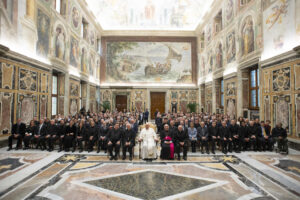
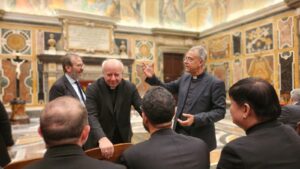
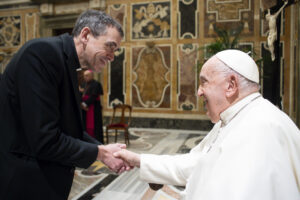
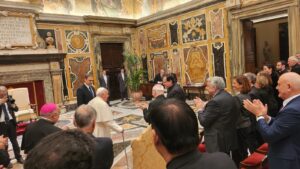
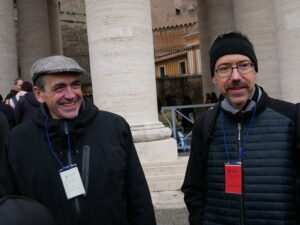
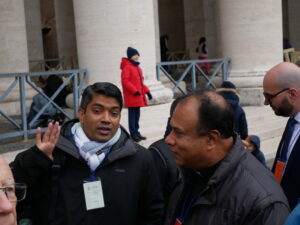
ADDRESS OF THE HOLY FATHER FRANCIS
TO THE ACADEMIC COMMUNITY OF THE PONTIFICAL THEOLOGICAL INSTITUTE
“JOHN PAUL II” FOR MARRIAGE AND THE FAMILY SCIENCES
Clementine Hall
Monday, 25 November 2024
Dear brothers and sisters, good morning!
It is with pleasure that I meet you at the beginning of the academic year. I greet and thank the Grand Chancellor, Archbishop Vincenzo Paglia, and the Dean, Msgr. Philippe Bordeyne, as well as the deputy deans of the international sections, the professors, the students, the members of the Benedict XVI Foundation, and the benefactors.
As you know, the Final Document of the 16th Assembly of the Synod affirms that families are “the pre-eminent context in which … we learn to experience the basic practices needed for a synodal Church” (no. 35): families. To this end, families need to be increasingly aware of being “active participants and not just passive recipients” with regard to family pastoral care, responsible for “the building up of the Church and a commitment within society” (no. 64). We know how decisive marriage and the family are for the life of peoples; the Church has always taken care of them, supported them and evangelized them.
Unfortunately, unfortunately, there are countries where the public authorities do not respect the dignity and the freedom that is the inalienable right of every human being as a child of God. Often constraints and impositions weigh especially heavily on women, forcing them into positions of subjugation, and this is very bad. Since the beginning, on the other hand, there were also women among the Lord’s disciples, and “in Christ Jesus”, writes Saint Paul, “there is neither male nor female” (Gal 3:28). This does not mean that the difference between the two is annulled, no, but rather that in the plan of salvation there is no discrimination between man and woman: both belong to Christ, they are “Abraham’s offspring, heirs according to promise” (v. 29). And speaking of women, an old priest used to say to me: “Be careful, don’t get it wrong because since the day of the Garden of Eden, they have been in charge!” [laughter].
Through Jesus, we are all “set free from sin, sorrow, inner emptiness and loneliness” (Apostolic Exhortation Evangelii Gaudium, 1), and the Gospel of the family is joy that “fills hearts and lives” (Apostolic Exhortation Amoris Laetitia, 200). It is this Gospel that helps everyone, in every culture, to seek always what conforms to the human and the desire for salvation rooted in every man and woman.
In particular, the sacrament of marriage is like the good wine served at the wedding feast of Cana (cf. Jn 2:1-12). In this regard, let us recall that the first Christian communities developed in a domestic form, expanding family units by welcoming new believers, and met in homes. As an open and welcoming home, from the very beginning the Church did its utmost to ensure that no economic or social constraints prevented people from following Jesus. Entering the Church always means inaugurating a new fraternity, founded on Baptism, that embraces the stranger and even the enemy.
Engaged in the same mission, even today the Church does not close the door to those who weary on the path of faith; on the contrary, she throws the door wide open, because everyone “need[s] pastoral care that is merciful and helpful” (Amoris Laetitia, 293). Everyone. Do not forget this word: everyone, everyone, everyone. Jesus said this when those invited to the wedding did not come, and Jesus says: “Go into the streets and bring everyone, everyone, everyone – But Lord, all the good ones, no? – No, everyone! Good and bad! Everyone, everyone”. Do not forget that word “everyone”, which is in a sense the vocation of the Church, mother of all.
The “logic of integration is the key to their pastoral care” for those cohabit, postponing indefinitely their marital commitment, and for divorced and remarried people. “They are baptized; they are brothers and sisters; the Holy Spirit pours into their hearts talent for the good of all” (ibid., 299). Their presence in the Church bears witness to the willingness to persevere in faith, despite the wounds of painful experiences.
Without excluding anyone, the Church promotes the family, based on marriage, contributing in every place and in every time to making the marital bond more solid, by virtue of that love which is greater than everything: charity (ibid., 89ff). Indeed, “the strength of the family lies in its capacity to love and to teach how to love”, the capacity to love and to teach how to love. No matter how wounded a family may be, “it can always grow, beginning with of love” (ibid., 53). In families, wounds are healed by love.
Dear friends, the challenges, the problems, the hopes that affect marriage and the family today are inscribed in the relationship between Church and culture, which Saint Paul VI already invited us to consider, emphasizing that “The split between the Gospel and culture is without a doubt the drama of our time” (Apostolic Exhortation Evangelii Nuntiandi, 20). Saint John Paul II and Benedict XVI further explored the theme of inculturation, focusing on issues of interculturality and globalization. The possibility to carry out fully the evangelizing mission that commits every Christian depends on the capacity to face these challenges. In this regard, the last Synod enriched the ecclesial awareness of all participants: indeed, the very unity of the Church demands the commitment to overcome cultural estrangements or conflicts, building harmony and understanding between peoples.
The John Paul II Institute is called upon to provide special cooperation in this field, through studies and research that develop a critical knowledge of the attitude of various societies and cultures with regard to marriage and the family. Therefore, I wanted the Institute to extend its attention also to “developments in the human sciences and in anthropological culture in a field so fundamental for the culture of life” (Apostolic Letter issued Motu proprio Summa familiae cura, Preamble).
It is good that the Institute’s campuses, present in various countries throughout the world, carry out their activities in dialogue with scholars and cultural institutions even with different approaches, as already happens with the Roma Tre University and the National Cancer Institute. We must advance these relationships, this is important.
I hope that all over the world the Institute may support married couples, that it may support families in their mission, helping them to be living stones in the Church and witnesses of fidelity, witnesses of service, witnesses of openness to life, witnesses of receptiveness. Let us walk together in the following of Christ! This synodal style corresponds to today’s great challenges, in the face of which families are a sign of fruitfulness and fraternity based on the Gospel. And in this style of Church, the proclamation of the Word is very important, but listening to the Word is more important. Before proclaiming, listen: listen to the Word as it is preached and listen to the Word that comes from the voices of others, because God speaks for everyone.
I wish you all a fruitful academic year. I bless you all, and I ask you, please, to pray for me. Thank you!